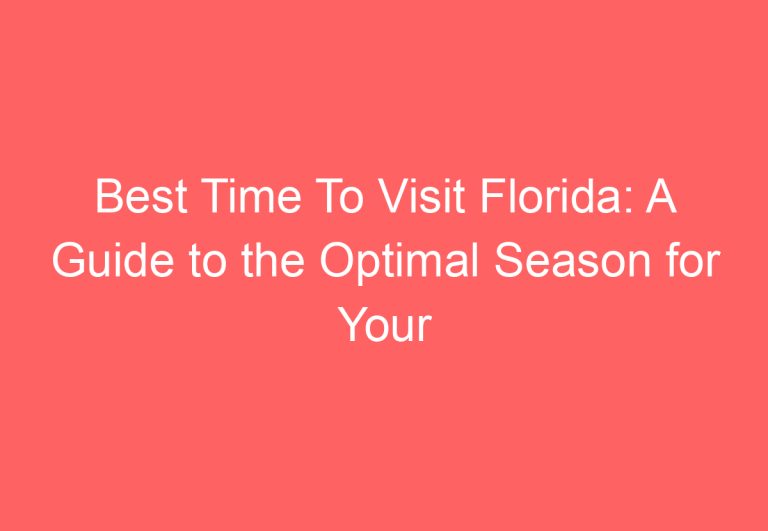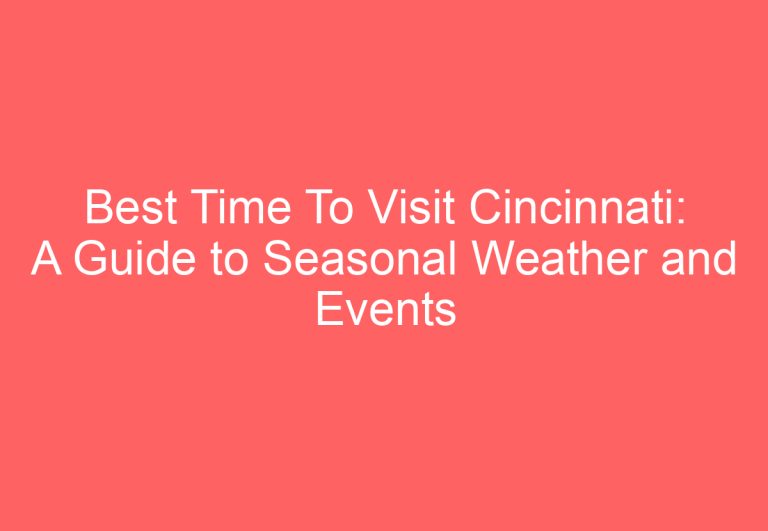Best Time To Visit Jacksonville Florida: A Clear Guide
Jacksonville, Florida, is a popular destination for tourists and locals alike, with its beautiful beaches, vibrant culture, and exciting attractions. However, choosing the best time to visit can be tricky, as the weather and crowds can vary greatly throughout the year. In this article, we will explore the best time to visit Jacksonville to help you plan your trip.

One of the most important factors to consider when planning a trip to Jacksonville is the weather. The city experiences a humid subtropical climate, with hot summers and mild winters. The best time to visit Jacksonville weather-wise is from March to May and September to November, when temperatures are mild and there is less chance of rain. However, if you are looking to hit the beach, the summer months of June to August are the most popular, with temperatures averaging in the high 80s.
Another factor to consider when planning your trip to Jacksonville is the crowds. The city can get quite busy during peak season, which runs from June to August, as well as during major events such as the Jacksonville Jazz Festival in May. If you prefer to avoid the crowds, consider visiting during the shoulder season of March to May and September to November, when the weather is still pleasant but there are fewer tourists.
Weather Patterns and Optimal Seasons

When planning a trip to Jacksonville, Florida, it is important to consider the weather patterns and optimal seasons for visiting. Jacksonville experiences a humid subtropical climate, with warm temperatures and moderate to high levels of humidity throughout the year.
Spring in Jacksonville: March to May
Spring is a popular time to visit Jacksonville due to its warm and pleasant weather. The average temperature during this time ranges from the mid-60s to low 80s Fahrenheit. Humidity levels are also moderate, making it a comfortable time to explore the city’s outdoor attractions. March and April are the driest months, with average rainfall of around 3 inches.
Summer Highlights: June to August
Summer in Jacksonville is hot and humid, with temperatures ranging from the mid-80s to low 90s Fahrenheit. The humidity levels are at their highest during this time, making it the least comfortable season to visit. However, summer is also the peak tourist season, with many outdoor events and festivals taking place. June and July are the wettest months, with average rainfall of around 6 inches.
Fall Transition: September to November
Fall in Jacksonville is a transition period, with temperatures starting to cool down and humidity levels decreasing. The average temperature during this time ranges from the mid-70s to low 80s Fahrenheit. September and October are the driest months, with average rainfall of around 3 inches. Fall is also a great time to visit Jacksonville for outdoor activities, such as hiking and biking.
Winter Overview: December to February
Winter in Jacksonville is mild, with temperatures ranging from the mid-50s to low 70s Fahrenheit. The humidity levels are also low during this time, making it a comfortable time to visit. December and January are the driest months, with average rainfall of around 2 inches. While winter is not as popular for outdoor activities, it is a great time to explore Jacksonville’s indoor attractions, such as museums and galleries.
Overall, the best time to visit Jacksonville is during the spring or fall, when the weather is comfortable and there are plenty of outdoor activities to enjoy. However, visitors should also consider their personal preferences and interests when planning their trip.
Cultural Events and Cost Considerations

Festivals and Events
Jacksonville is a vibrant city that hosts several cultural events throughout the year. Visitors can enjoy live music performances, food festivals, and sporting events. The Jacksonville Jazz Festival, held in May, is a must-attend event for jazz enthusiasts. The festival features world-renowned musicians and attracts thousands of visitors from around the world.
Another event worth attending is the Gate River Run, a 15K race held in March. The race attracts runners from all over the world and is a great way to experience Jacksonville’s beautiful scenery.
Springing the Blues is another popular event that takes place in April. The event features blues musicians from around the country and is held at the Jacksonville Beach.
Jax River City Pride is a colorful and vibrant event held in October. The event celebrates the LGBTQ+ community and features a parade, live music, and food vendors.
Hotel and Travel Expenses
Traveling to Jacksonville during peak season can be expensive. The peak season in Jacksonville is from June to August when the weather is hot and humid. Visitors can expect to pay higher prices for flights and hotels during this time.
The shoulder seasons, from March to May and September to November, are the best times to visit Jacksonville. The weather is pleasant, and there are fewer tourists, which means lower prices for flights and hotels.
For visitors looking for the cheapest way to get to Jacksonville, flying into Jacksonville International Airport is the best option. The airport is located just 15 minutes from downtown Jacksonville and is served by several major airlines.
When it comes to hotels, visitors can choose from a wide range of options that cater to different budgets. Downtown Jacksonville has several luxury hotels, while the beaches have more affordable options.
In conclusion, Jacksonville is a great destination for visitors looking for a cultural experience. Visitors should consider attending one of the city’s many festivals and events. Traveling during the shoulder season can help visitors save money on flights and hotels.
Frequently Asked Questions

What months offer the most pleasant temperatures for visiting Jacksonville?
Jacksonville is known for its warm weather, with temperatures averaging around 70°F. The best time to visit Jacksonville is between March and May, when the temperatures are mild, and the humidity is low. Visitors can enjoy outdoor activities such as hiking, biking, and beach-going during this time.
What activities can visitors enjoy in Jacksonville throughout the year?
There are plenty of activities to enjoy in Jacksonville throughout the year. Visitors can explore the city’s museums and art galleries, attend music festivals, and enjoy recreational activities like golfing and fishing.
During which month does Jacksonville experience the highest temperatures?
The hottest month in Jacksonville is typically July, with temperatures averaging around 90°F. Visitors should be prepared for high humidity and the possibility of thunderstorms during this time.
What should travelers expect for weather conditions in Jacksonville during December?
December is one of the cooler months in Jacksonville, with temperatures averaging around 60°F. Visitors can expect occasional rainfall and cooler temperatures, but can still enjoy outdoor activities like hiking and biking.
What are the peak and off-peak tourism seasons in Jacksonville?
The peak tourism season in Jacksonville is during the summer months, from June to August. Visitors can expect higher prices and larger crowds during this time. The off-peak season is from November to February, when the weather is cooler and the crowds are smaller.
How can one enjoy a full day in Jacksonville with local attractions and activities?
One can enjoy a full day in Jacksonville by visiting local attractions such as the Cummer Museum of Art and Gardens, the Jacksonville Zoo and Gardens, and the Museum of Science and History. Visitors can also enjoy outdoor activities like hiking and biking in the city’s parks and nature preserves. Additionally, the city has a vibrant food and drink scene with many restaurants and bars to choose from.






